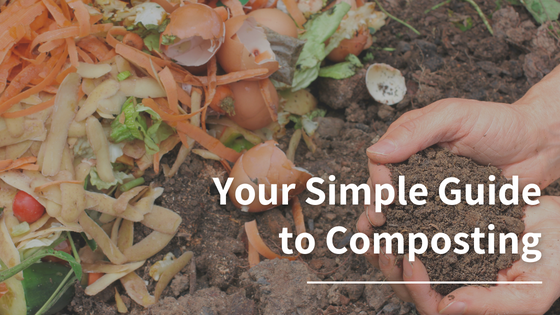Composting is a great way to get rid of household waste in a sustainable way. But it can be confusing knowing what you can and can’t compost. In this guide we will provide an overview of what is and isn’t compostable, and some composting tips. We hope you find it helpful!

What are the benefits of composting?
Composting has many benefits. Compost enriches the soil, helping to retain moisture as well as preventing plant diseases and pests. It also encourages the growth of beneficial fungi and bacteria which breaks down organic matter to create humus, a nutrient-filled material. This reduces the need for chemical fertilisers which are harmful to the environment. It also reduces landfill emissions and your carbon footprint as you’re composting waste instead of putting it in the bin.
What can I compost?
Anything that was once alive is compostable, however it is best to stay away from composting meat, dairy or cooked food as this may attract vermin. Materials such as grass clippings and weeds break down quickly, working as activators to get the compost started. However, it is best to mix these with other materials as on their own they will quickly rot and create a smelly mess. As a general rule your compost should consist of: 25-50% soft green materials (grass cuttings, vegetable waste, annual weeds). and the remainder should be made up of woody brown materials such as: shredded paper, cardboard, wood chippings and dead leaves. Avoid letting any one type of material dominate your compost heap.

You can compost:
- Green Materials:
- Fruit and vegetable scraps
- Grass cuttings
- Coffee grounds
- Fresh leaves
- Flowers
- Leafy plants (incl. annual weeds)
- Tea bags (ideally plastic-free)
- Brown Materials:
- Shredded paper
- Cardboard (shredded)
- Eggshells
- Dead leaves
- Newspaper
- Hedge trimmings
- Woodchip
Do not compost:
- Meat, fish, dairy or cooked food
- Cat litter
- Diseased plants
- Charcoal ash
- Plants that have been treated with pesticides or preservatives
- Animal waste
- Oil and grease
- Harsh chemicals
Bear in mind that it takes 6 months to 2 years for compost to reach maturity. Mature compost will be dark brown in appearance, with a soil-like texture. Any material that hasn’t reached this stage can always be added to your next compost heap.
Composting tips
Here are a few of our top tips to ensure that your compost pile thrives!
Place your compost bin in a shady area
Placing your compost bin in an area with shade will prevent the materials inside from getting too hot and breaking down too quickly.
Turn your compost every 4-6 weeks
Turning your compost heap helps to mix everything up and accelerates the composition process. It allows air to reach the different layers of compost, which is necessary for composting to occur.
Make sure your compost isn’t too dry or too wet
You should ensure that your compost pile stays moist, but not too wet (it should feel like a damp sponge). If it feels too dry, simply add water. To prevent your compost from becoming too wet, use a compost bin which comes with a lid or cover your compost heap to protect against rain.
Shop composters at Fairwayrock.com
Our online marketplace sells a wide range of composters. This Ward Ecomax Composter 220L is perfect for your garden, allowing you to turn your kitchen and garden waste into plant-nourishing compost. This composter is made from recycled materials and can hold up to 220L of waste. If you’re looking for a worktop composter this Large Kitchen Composter Caddy is ideal. It features a removable inner plastic bucket, an odour filter in the lid (with 2 spare filters) and a large carry handle.
We hope you enjoyed this blog post! You can follow us on our social medias for more sustainability tips. You can find us on LinkedIn, Instagram, Facebook and Twitter.
Tags: compost, composting, garden, gardening, sustainability



4 thoughts on “Your Simple Guide to Composting”
Comments are closed.